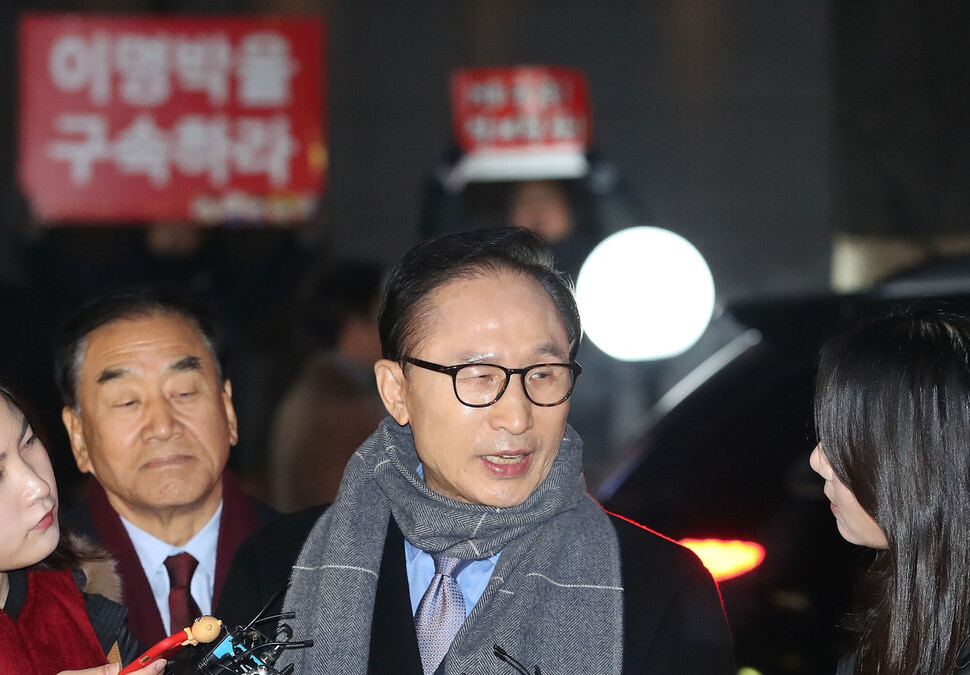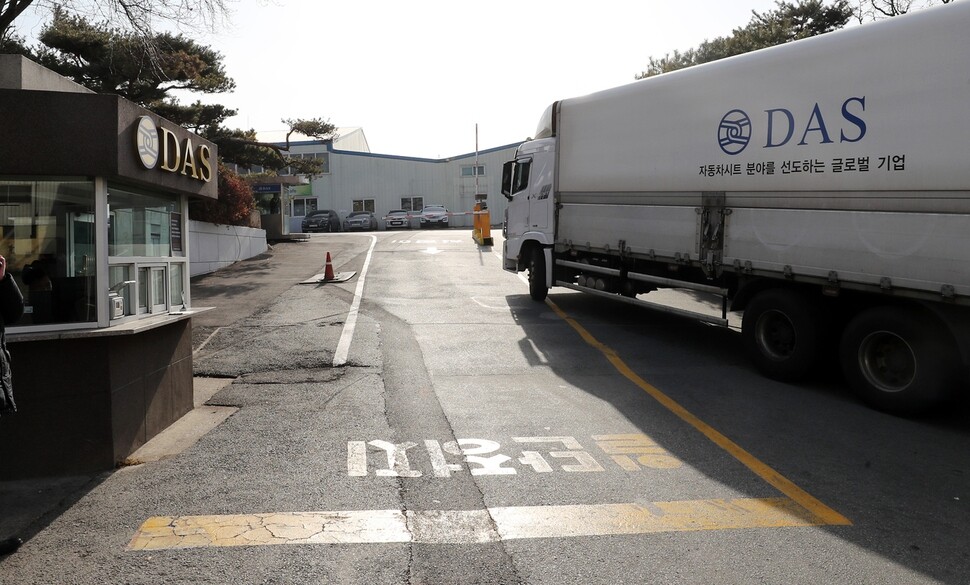hankyoreh
Links to other country sites 다른 나라 사이트 링크
Lee Myung-bak arrest warrant relies heavily on accusations stemming from DAS

Fifty pages, or more than half, of the 90-page report that South Korean prosecutors composed to request a detention warrant against former president Lee Myung-bak deals with automobile parts manufacturers DAS, the Hankyoreh learned on Mar. 20. The report provides a point-for-point rebuttal of the lies that Lee has made about DAS over the past 22 years. According to the report, Lee provided all the capital used to set up DAS, and after Lee’s inauguration as president, the Blue House became little more than an office dedicated to helping Lee inflate his assets. In the report, the prosecutors said that Lee’s illegal activity connected with DAS was a grave matter of state that could have given cause to nullify his election as president.
“Trying to build and grow an auto parts company”
The prosecutors’ report shows the lightning speed with which DAS was established following a single order from Lee. While Lee was working as the CEO of Hyundai Engineering and Construction (Hyundai E&C) in 1985, Chung Se-yung, then-chair of the Hyundai Motor Company, suggested that he set up a subcontractor. Lee then reportedly told Kim Seong-u, then director of the management division at Hyundai E&C and later DAS’s CEO, that he was “trying to build and grow an auto parts company” and that he wanted Kim to “set up a company.”
Using funds received from Lee, Kim spent two years preparing for the company by buying land for a factory. 100% of the 396 million won (US$370,000) in capital used to establish DAS, which eventually began operations in July 1987, was provided by Lee, the prosecutors said.
Lee filled DAS’s executive suite with close associates such as Kim and Kwon Seung-ho, an employee of Hyundai E&C and later DAS’s managing director. From July 1987 until Feb. 2008, Lee received periodic briefings from these executives not only on the overall situation at the company, including the settlement of accounts and the operation of funds, but also major decisions, such as large-scale facilities investments, and personally gave orders about how to deal with these matters, according to the report. Lee also helped his son Si-hyeong, who started working at DAS in Aug. 2010, to take control of the company.
Beginning in Jan. or Feb. 2011, all matters connected with overseas branches were brought to Lee Si-hyeong for confirmation before being put on the desk of the CEO, and his approval was required for all expenses of 10 million (US$9,300) won or more.

Since Lee had concealed the fact that he was DAS’s owner, the method he chose to pocket the company’s profits was the development of a slush fund. Lee is accused of having created a slush fund worth 33.9 billion won (US$32 million) by siphoning off DAS’s corporate money between Nov. 1991 and July 2007. Lee brought together this slush fund from a variety of illegal funds received from companies in the private sector, and various assets registered under the names of other people, such as his brother-in-law Kim Jae-jeong and his older brother Lee Sang-eun.
He then had these funds managed by his “financial custodians” Kim Jae-jeong; Lee Byung-mo, executive secretary of the Cheonggye Foundation; and Lee Young-bae, CEO of Geum-gang. After being laundered, these illegal funds were reportedly used on campaign spending; providing “small gifts” to influential figures, including friendly journalists; making donations to fellow lawmakers in the National Assembly; and covering the cost of operating private organizations, including Lee’s personal office at the East Asia Institute.
During the early 1990s, Lee personally ordered the creation of the slush fund and also personally selected the people to deliver the funds. He even went so far as to cross-check the total amount of money while managing the slush fund, the prosecutors said. Every year, he would receive a report about the total amount of the slush fund from Kim Seong-u and Kwon Seung-ho, along with a separate report, also about the total amount, from Kim Jeong-jae, who was in charge of money deliveries.
Lee was cross-checking the totals in order to make sure no money was being lost. But when he made up his mind to run for president in 2006, toward the end of his term as mayor of Seoul, Lee ordered work on the slush fund to stop. “I have a big dream, so stay away from anything risky from this year on,” he reportedly said.
“If this had come out ten years ago, it would have changed the results of the election”
Every time the prosecutors have investigated him, Lee has dodged criminal prosecution through organized destruction of evidence and rehearsed testimony. When he was running for a seat in the National Assembly in 1996, he was indicted on the charge of using DAS’s corporate funds in his campaign, but he maintained his innocence.
In the run up to the 2007 presidential election, Lee was investigated first by the prosecutors and then by special prosecutor Chung Ho-young from July 2007 to Feb. 2008, but investigators held back because of their awareness that he was likely to win the election. If his ownership of various assets and real estate – including stock in DAS, land in Seoul’s Dogok neighborhood and a villa in Gapyeong, Gyeonggi Province – had come to light, it would have even been possible to nullify his election.
This likelihood is why the prosecutors wrote in their report that “The promulgation of false statements about a candidate’s assets with the purpose of winning an election constitutes a violation of the Public Official Election Act. Conviction in a criminal case would lead to a sentence of imprisonment or a fine of at least 1 million won (US$930), and if the judgment had been confirmed on appeal, the election would have been nullified immediately without any further litigation. As such, this was a grave situation in which the outcomes of the prosecutors’ and special prosecutor’s investigations could have decided whether Lee would have taken office as president.”
“If the true owner of DAS had been revealed during the prosecutors’ and special prosecutor’s investigations ten years ago, I don’t think that Lee would have been inaugurated as president. Lee’s crimes changed the course of history,” a senior prosecutor said.
Another fact that turned up during this investigation was that Lee set up a “response committee” before the presidential election that held several rehearsals for DAS executives and staff to practice giving false testimony if questioned by the prosecutors and that destroyed documentary proof and deleted digital material to prepare for a potential raid by the authorities. The committee also arranged escape plans for people who had let Lee register accounts under their names.
By Seo Young-ji, staff reporter
Please direct questions or comments to [english@hani.co.kr]

Editorial・opinion
![[Column] Park Geun-hye déjà vu in Yoon Suk-yeol [Column] Park Geun-hye déjà vu in Yoon Suk-yeol](https://flexible.img.hani.co.kr/flexible/normal/500/300/imgdb/original/2024/0424/651713945113788.jpg) [Column] Park Geun-hye déjà vu in Yoon Suk-yeol
[Column] Park Geun-hye déjà vu in Yoon Suk-yeol![[Editorial] New weight of N. Korea’s nuclear threats makes dialogue all the more urgent [Editorial] New weight of N. Korea’s nuclear threats makes dialogue all the more urgent](https://flexible.img.hani.co.kr/flexible/normal/500/300/imgdb/original/2024/0424/7317139454662664.jpg) [Editorial] New weight of N. Korea’s nuclear threats makes dialogue all the more urgent
[Editorial] New weight of N. Korea’s nuclear threats makes dialogue all the more urgent- [Guest essay] The real reason Korea’s new right wants to dub Rhee a founding father
- [Column] ‘Choson’: Is it time we start referring to N. Korea in its own terms?
- [Editorial] Japan’s rewriting of history with Korea has gone too far
- [Column] The president’s questionable capacity for dialogue
- [Column] Are chaebol firms just pizza pies for families to divvy up as they please?
- [Column] Has Korea, too, crossed the Rubicon on China?
- [Correspondent’s column] In Japan’s alliance with US, echoes of its past alliances with UK
- [Editorial] Does Yoon think the Korean public is wrong?
Most viewed articles
- 1‘We must say no’: Seoul defense chief on Korean, USFK involvement in hypothetical Taiwan crisis
- 2N. Korean delegation’s trip to Iran shows how Pyongyang is leveraging ties with Moscow
- 3Amnesty notes ‘erosion’ of freedom of expression in Korea in annual human rights report
- 4[Column] Park Geun-hye déjà vu in Yoon Suk-yeol
- 5‘Weddingflation’ breaks the bank for Korean couples-to-be
- 6[Reportage] On US campuses, student risk arrest as they call for divestment from Israel
- 7[Editorial] New weight of N. Korea’s nuclear threats makes dialogue all the more urgent
- 8Korea sees more deaths than births for 52nd consecutive month in February
- 9Will NewJeans end up collateral damage in internal feud at K-pop juggernaut Hybe?
- 10Why Korea shouldn’t welcome Japan’s newly beefed up defense cooperation with US